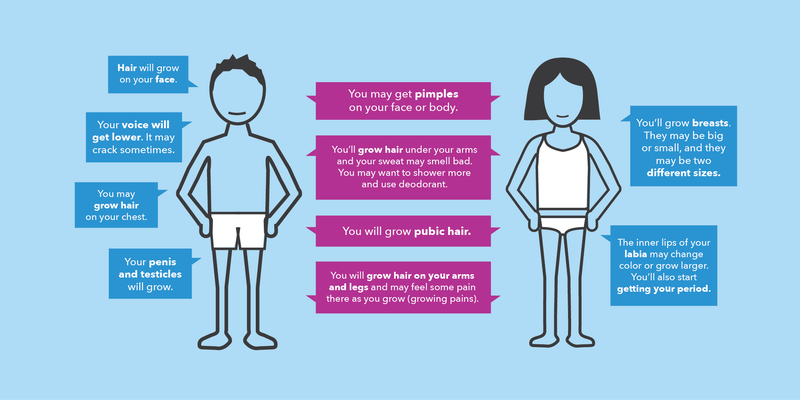Understanding & Discussing Puberty in The Classroom
Puberty is the process through which a child’s body matures into an adult body capable of sexual reproduction. It involves many physical and emotional changes. It is essential that the children should be told and be aware of these changes before their onset. Pre-Teens (10-13 years) are a good time to have the talk about the onset of puberty.
In girls, puberty brings about
- growth spurts
- weight gain
- development of breasts
- growth of body hair including pubic hair
- onset of menstrual bleeding
- excessive perspiration
- increased oiliness of skin and hair
- slight changes in color and shape of genitalia
- vaginal discharge
(click here for more – Physical Changes During Puberty in Girls)
In boys, puberty brings about
- growth spurt
- body odor
- acne, broadening of chest & shoulders
- changing of voice
- appearance of facial, body and pubic hair
- increase in size of genitals
- retraction of foreskin
- onset of the ability to gain erection and ejaculate
(click here for more- Physical Changes During Puberty in Boys)
The Emotional Changes During Puberty include:
- Feeling overly sensitive – easily irritable, angry and depressed.
- Looking for an identity – figuring out how you are different from others.
- Feeling uncertain (eg:- about the future)
- Feeling peer pressure
- Conflicting and confused thoughts
- Frequent and Maybe Extreme Mood swings
- Feeling conscious about self
- Getting sexual feelings
(click here for more:- Emotional Changes During Puberty in Boys & Girls)
The Topics That You Will Need to Cover
Understanding the body: Girls need to know about breast development and menstruation. Boys need to know about erections and wet dreams. Don’t tiptoe around these subjects. If they don’t get the information from you, they’ll get some distorted version of it from their peers.
Showering: Once puberty hits, daily showering becomes essential. Recommend that they use a mild soap and concentrate on the face, hands, feet, underarms, groin and bottom. Washing under the fingernails is key, too.
Washing hair: Discuss the pros and cons of daily hair washing. Some teens may prefer to skip days to prevent their hair from drying out. Others may want to wash their hair daily — especially if they have oily hair, which can both look greasy and aggravate acne.
Using deodorant or antiperspirant: When puberty hits, the glands become more active and the chemical composition of the sweat changes, causing it to smell stronger. Using deodorant or an antiperspirant should become part of their daily teen hygiene.
Changing clothes: Get your teen to understand that along with showering, wearing clean clothes each day is an important part of teen hygiene. Point out that cotton clothes may absorb sweat better than other materials.
Preventing acne: At around age 10, it makes sense for teens to start washing his or her face twice a day. Make sure they understand not to wash too vigorously, even if her skin is oily. Trying to scrub off the oil will just leave the skin cracked and irritated.
Shaving and hair removal: You can offer a brief course on razor use. Whether or not he or she wants to shave yet, at least you’ve provided the information. Girls may also need some reassurance; stray facial hairs that loom large when she’s an inch away from the mirror may not be visible to anyone else.
Maintaining good oral health: Brushing is crucial, especially if they’re drinking coffee and sugary, acidic sodas and sports drinks. It’s not only about tooth decay. Bad oral hygiene leads to bad breath.
Combating Teen Hygiene Myths
Talking about the importance of good teen hygiene also means discussing what’s not important. When you’re a teenager, your understanding of how the body works is bound to be riddled with misconceptions and myths. Some common teen hygiene legends include:
- Shaving makes hair grow back faster and thicker
- Girls need to douche or else they’ll smell
- Greasy foods cause acne
- Getting a tan will cure acne
- Masturbation causes blindness, hairy palms, madness, and other health calamities
Click here for Menstrupaedia‘s amazing list of resources on explaining puberty, menstruation, hygiene & myths
(source: WebMD, Menstrupaedia)








